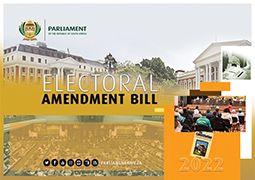
The recent local government elections results proved that the people of the Northern Cape want a constituency-based system. This was the view of residents when they attended public hearings hosted by the Portfolio Committee on Home Affairs on the Electoral Amendment Bill. The committee concluded the public hearings in the province with one in Kimberley.
According to participants, the election of independent candidates in the province is proof enough that the community wants accountability for service delivery. “In Pixley Ka Seme District Municipality, which has eight local municipalities, a number of independent candidates have been voted in. In Siyathemba Local Municipality about 40% of the community said they wanted independent candidates by voting independents into power. In Siyancuma Local Municipality three independents have been voted into power, with that team turning things around in a short period of time. So, in Kareeberg, civil movements have said: we want accountable government,” said Mr Ronald February, a councillor from Siyathemba municipality.
There were some that questioned the intention of the Bill to discard votes in excess of the required quota. “How is it fair to the people and the right to vote if an independent candidate that receives excess votes have those votes discarded? Also, we need to open the 400 seats and make them available for everyone. We foresee that the discarded votes will lead to legal challenge,” Mr February argued.
While some were against the Bill, the majority supported the Bill, albeit with various conditions. Some of the stricter measures proposed included the inclusion of a threshold requiring independent candidates to submit over 20 000 verified signatures to weed out frivolous candidates.
Residents also said that independent candidates should be treated in the same way as political parties in relation to paying electoral deposits, to ensure fairness. Similarly, they also said that vacant independent seats should remain vacant to avoid ongoing national by-elections, which would have serious cost implication for the state.
Furthermore, there was support for the proportional representation model, as participants said it would allow for greater representation of women, youth and other marginalised groups, who would ordinarily be excluded under a constituency-based system.
But besides various differences relating to the implementation of the Bill, the point of convergence was that the participation of independent candidates was necessary and a sign of a maturing democracy.
The conclusion of the Northern Cape hearings means that the committee has now concluded hearings in four provinces – Limpopo, Mpumalanga, KwaZulu-Natal and Northern Cape.
Malatswa Molepo
14 March 2022

